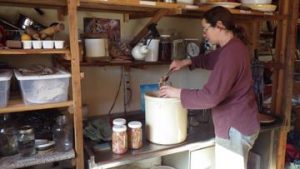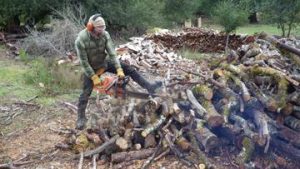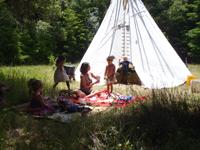
Author and kraut: Since we don’t have a commercial kitchen, the world may never know my kraut and kimchi.
Author: Abeja Hummel
Published in Communities Magazine Issue #158
The dirt road to the valley floor winds its way through oak woodlands and past an enormous corporate vineyard. It bisects our neighbors’ small horse farm and a massive overgrazed cattle ranch. If you had told me seven years ago that I’d have a 30-minute commute alone in my car to get to work twice a week, I’d have pointed out that I’d never even owned a car, that I don’t need much money, and certainly don’t work for “the man.”
It’s true, I have biked the road many times, and even driven our mule cart to town. Still, I’ve grown to really appreciate my biodiesel Jetta, and find I actually enjoy the time and space I get driving slowly through the countryside on my way to my bodywork practice in Boonville. Some would say I’ve grown up, some would say I’ve sold out. I would say that I have learned to compromise for love and a larger purpose. Having a child and living at Emerald Earth—a small, rural ecovillage in northern California—have taught me a lot about compromise.
We are incredibly blessed in that our land is owned—outright—by a nonprofit, so we aren’t pouring money into a mortgage. As this is not currently an income-sharing community, we strive to keep the costs low for residents, and share the values of right livelihood and self-reliance. We are deeply engaged in rediscovering an interconnected, regenerative relationship with our land. We produce or wildcraft much of our own food, and sell or trade the surplus to neighbors for things we don’t have. Our kitchen is usually packed with fresh, local, healthy, nutrient-dense foods. Processed, packaged, and sugary foods arrive only with unindoctrinated guests.
The cows and goats produce way more milk than we can consume, which we share with friends and turn into cheese and yogurt—all grass fed and higher quality than almost anything you can buy in a store. The chickens move around, cleaning and fertilizing our gardens and pastures and giving us in return delicious eggs with deep orange yolks. Our gardens pump out amazing organic produce. And on top of that, people from all over (though mostly the San Francisco Bay area) pay us to come to our community to take our workshops in natural building and other land-based practices.
So why is it, then, that I’m getting into my car twice a week and driving to town? Why is it that most residents here find it essential to have a well-paying off-site job, some savings, and little to no debt?
In the mythology of America, families can be completely supported by a successful small farm. Yet we find ourselves walking a line between radical self-sufficiency and the realities of the dominant culture’s economic and social systems. We work jobs in town out of fear—must keep health insurance, must have car insurance, must pay debt. We also make money to pay for the fun things we still want from “out there”—a ski trip this winter, a new guitar, a music festival. So we work for someone or something else—taking our time and energy away from the vision we hold for ourselves and this land.
Our plan is to move towards the possibility that all residents can make a living on the land. We believe that a bounty of valuable goods and services can be gleaned in the process of revitalizing degraded topsoil, caring for the forests and creeks, collecting nature’s abundance, and bringing life back towards the balance the native Pomo so carefully tended. This bounty includes milk and meat from goats that clear the underbrush from the thrice-logged tinderbox we see as an old-growth forest in the making. Proper management of our cows is rebuilding topsoil in our oak woodlands, as we watch the fertility and biodiversity increase over the years. We can envision a surplus of lumber—or at the very least firewood—resulting from a forestry plan that increases the health of the forest while decreasing the fire load. Mushrooms, acorns, and all sorts of other wild edibles offer themselves to us every year and we believe—as the Pomo have taught us—that wild things WANT to be respectfully gathered and used, and that their life cycles are benefited by that relationship.
I have a lot of time to think about these things, as I drive up and down the hill to work. I have considered abandoning my business in town many times and have experimented with various income sources from the land. Our first year here, my husband and I diligently went to the farmers’ market with surplus fruit from ours and our neighbors’ land, as well as wildcrafted mushrooms and seaweed. I also did chair massage. It was very socially rewarding and completely in line with our values. We made somewhere around $4 an hour for the harvesting and time at the market—we did not calculate in time spent caring for the fruit trees. The only real income derived from that time is the regular clients I gathered for my bodywork practice.
In America we are accustomed to buying food—as well as every other mass-produced commodity—cheaply. Selling the tastiest eggs you’ve ever tried at $6 a dozen, I would walk the line between red and black after figuring in the cost of supplemental organic feed. And that would come with a huge amount of work and folks complaining about my eggs being too expensive. Same math for the incredibly delicious fresh bread we bake in our wood-fired cob oven with local, organic, stone-ground wheat. (The saint who is growing the local wheat, I might add, is doing it as a labor of love at $1 a pound.) With time, good marketing, and cultivated relations with neighbors, however, I see examples of folks in our community making a go at it in small-scale, sustainable food production.
It is not only the massive reduction of income that keeps me from making the shift to a land-based cottage industry that is more in line with the goals of Emerald Earth and leads to much greater self-reliance as a community. Another factor is just the effort required. It’s easy to go to town and come home with money. More than that, I would say, it’s pleasant to do so. I live in a small ecovillage where we share two meals a day, have a dozen community projects going, and are blessed with the presence of kids needing attention. My drive to work is often the only quiet time I get all week, and being at work is the only time I’m not at risk of being distracted or interrupted by children, visitors with questions, or residents with needs or concerns.
Also, I get to make all the decisions about my business by myself, without asking anyone’s opinions or permission, and without receiving feedback about how my choices affect each and every person living with me! Save the lecture about how important it is to work collectively, how much better decisions are when made in a group, and the pitfalls of our individualistic culture. I know and I agree—that’s why I live in community. I also think it is important for individuals—adults and children alike—to have autonomy in some aspects of their lives. Running a land-based business on a property that you collectively steward with others is like navigating a ship through iceberg-laden waters.
Last year, my fellow resident Liz and I bought two cows, milking equipment, and miles of electric fencing. The goal—to use the cows to build topsoil and restore fertility to the native oak grasslands while producing delicious, nutrient-dense, raw dairy and grass-fed meat for us and to share with others who value that quality of food.
Everyone was supportive. Really, they were. It was hard to remember that, though, as we heard all the concerns—“Is that unsightly fencing going to stay there, where I like to go for a walk every day?” “The cows’ hoof prints in the wet soil look like they’re tearing up the land!” “It feels disrespectful that you keep having to leave meetings early to go milk.” “I don’t think you’re paying the community enough rent considering the impact you’re having on the land and the infrastructure” etc., etc. All valid concerns. All the sorts of concerns I would raise, myself, to someone else starting a business. But, as someone working her butt off trying to make a new project fly—or at least to be worth the money I’d put into it—it was difficult and discouraging.
All that for a project that if we wanted it as a business would make us less than minimum wage while not being quite exactly legal.
Which brings me to what I see as the biggest barrier many small, land-based businesses face—the prohibitive cost of time and money to comply with environmental, food safety, and other laws. I’m not a libertarian, and I fully support the spirit of most of these laws. Giant dairies—whose animals have numbers, not names—really should have a completely sterile environment and a $500,000 bottling facility. They shouldn’t sell raw milk, and they do need to be inspected regularly. (I will not get into the debate over raw vs. pasteurized milk except to say that I would strongly warn against raw milk from an animal without a name, provided to you by a person you don’t know.)
Some people use the “herd share” shared ownership model, where neighbors buy a “share” of the herd, and therefore get a share of the milk. Then they pay the farmer to care for and milk their animals for them. Everyone signs detailed contracts and understands what they’re doing and the risks they are taking, drinking milk from an uncertified dairy. They are welcome to come visit their cows and watch the farmer milk them. They can even participate and muck out the barn! We’d love to do this. The herd has grown to three beautiful jerseys—Blossom, Honey, and Molasses. If any one of them becomes the slightest bit sick, I guarantee we’ll notice.
And this is, as far as the feds are concerned, completely illegal. Last year, several herd share operations were busted throughout the state and the country. (Visit www.farmtoconsumer.org for more information.) This crackdown is ostensibly to protect public health, though it oddly seems to do more to protect corporate dairy profits. It is easier here in northern California to legally grow marijuana than it is to sell milk, cheese, pickles, or preserves—all of which require expensive equipment, commercial kitchens, and regular inspections. (Note: I recently learned of a new law passed in California which will make small cottage food production possible—though it excludes dairy.)
Other small business opportunities here are similarly legally dubious. Our workshops and classes, for example, involve us feeding folks. We do not have a commercial kitchen, or submit to regular inspections. Any plan to care for our forest through thinning will require an expensive and time-consuming Non-Industrial Timber Harvest Plan (NTHP) prepared by a licensed forester. Only then could we begin selling firewood or lumber legally. Capitalizing any of these ventures legally would take major investment or big debt, which is a part of the system we are trying to escape.
Liz took the plunge. She has taken a break from her eight-year-old acupuncture practice in town to fully engage with her passion. She is now working towards the greater vision, fully embodying the Permaculture principles of care for the land, care for the people, and return the surplus.
I chickened out. I still help milk the cows, and I deliver milk to friends in town on my way to work. But most days I sleep in ’til 6:30 or 7 a.m. (luxurious), spend more time with my family—not with them following me around as I do chores at the barn—and stress less about money.
And so I drive up and down the hill, freshly showered, back seat full of coolers of milk, with most of the dirt dug out from beneath my fingernails. I bridge the worlds, bringing some money back into our community, enjoying the drive and reviewing my decisions. For now, there is peace in the compromise.















marcine
I appreciate reading this as reality check! As a couple looking for a community that has marginal funds and the desire to work in community, not on the outside I see why the opportunities for such a life are dismal out there. But that we keep the vision and do what we can do to continue to feed it are important, as well as heal the wounds of the old paradigm. Thanks for holding the space!
artgal
Abeja, Very interesting and well written post. I’ve just begun researching communal living for my son. I’m still trying to envision it.
My son, age 40, is going through some emotional challenges, feelings of failure that his life is not the success he feels it should be. He’s a hard worker and well suited to outdoor work. In his youth, he enjoyed working in nurseries. Now, he barely keeps himself supported with his own residential window cleaning business. Our talks evolved to the idea of joining a working commune. Your own personal conflicts rang so true with me, particularly the way our government has made living debt free an impossibility. And a legally compliant business is out of reach for most.
I wonder if you could share any resources to further our research into this topic? He’s in Florida & would prefer to remain local but any links to info explaining the concept & requirements of a co-op would be much appreciated.
Thanks for sharing your reflections.
NOTE FROM FIC STAFF: You can find lots of info. about how to find and join an intentional community here: http://dev.ic.org/in/enews/eNews2013March23.php